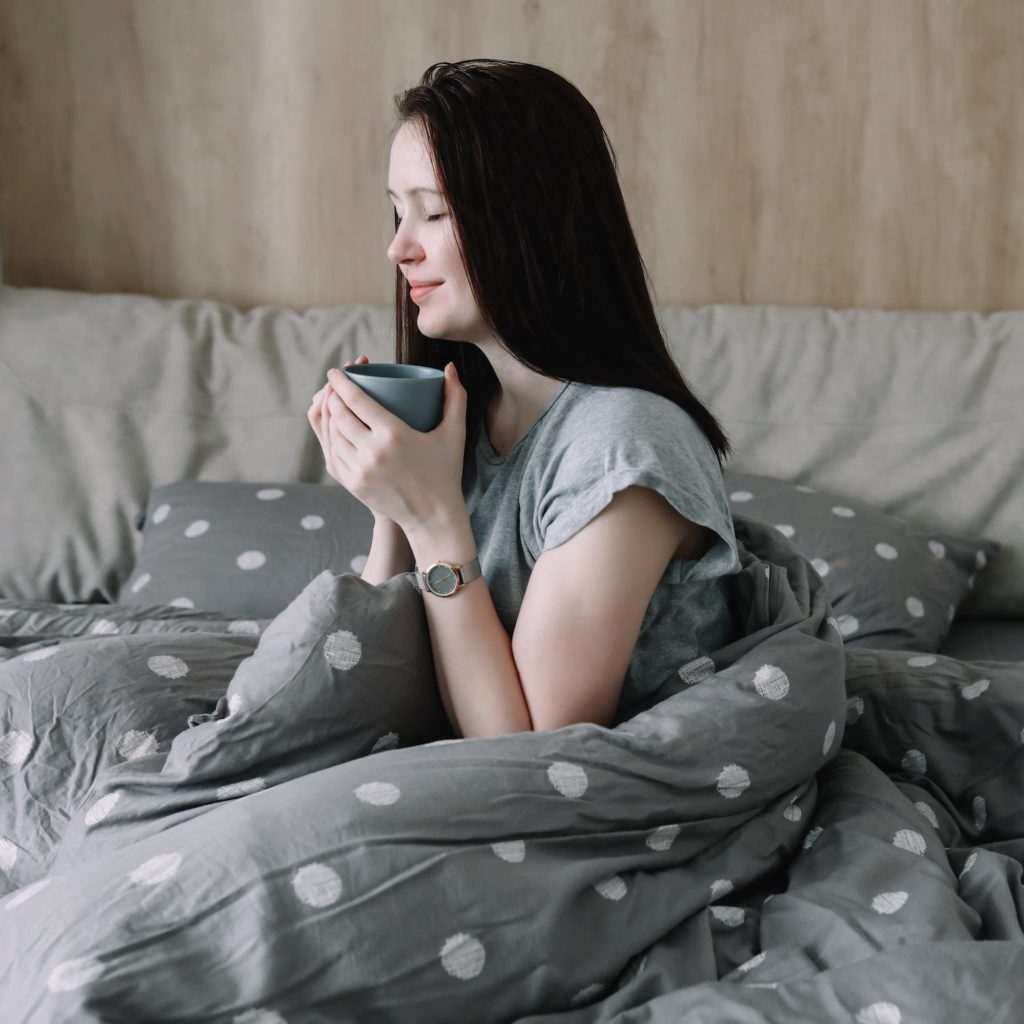When your body loses more water than it consumes, you can develop temporary dehydration. During mild dehydration, you may feel thirsty, have a dry mouth, and urinate less. But if dehydration becomes severe,you may feel faint or confused. In extreme cases, dehydration can hinder your body’s ability to perform basic metabolic functions.
The relationship between dehydration and sleep is complex and not entirely understood. We review how dehydration might affect sleep, how poor sleep might affect hydration, and how you can stay hydrated through the night.
The Connection Between Dehydration and Sleep
Not many studies have looked at the connection between sleep and dehydration. However, initial research has found that people who sleep less are also likely to be less hydrated. Although researchers don’t fully understand how falling short on sleep and being dehydrated are related, they’ve identified some potential connections.
How Dehydration May Impact Sleep
Drinking more water and staying hydrated is generally associated with better sleep. This has led some experts to suggest that being dehydrated can negatively impact sleep. But to date, there is only limited evidence that dehydration directly affects how well or how long a person might sleep.
However, dehydration can affect a person’s health in other ways that may affect sleep, such as by causing headaches. Although researchers haven’t explicitly studied how dehydration-induced headaches affect sleep, studies have found that, in general, headaches can disturb sleep.
There may also be a connection between dehydration and obstructive sleep apnea (OSA), which involves lapses in breathing during sleep. Some researchers propose that staying well-hydrated could potentially relieve some of the physical effects of obstructive sleep apnea.
How Poor Sleep May Affect Dehydration
Poor sleep may influence hydration by affecting how the body regulates fluids. In the later hours of sleep, the body releases greater amounts of a hormone called vasopressin, which helps the body retain fluids. If this later sleep doesn’t occur or is disrupted, dehydration may become more likely because the sleeper doesn’t experience the increase in vasopressin.
However, researchers aren’t certain exactly how sleep affects hydration, because the topic hasn’t been widely studied. There could be another explanation for the connection between short sleep and dehydration, such as people who are sleep-deprived also not drinking enough liquids.
Certain sleep problems might lead to more nighttime fluid loss. For example, night sweats are episodes of moderate to severe sweat production during sleep. This type of sweating is common and often harmless. However, profuse sweating that leads to water loss can contribute to dehydration.
How Does the Body Lose Water During Sleep?
The body primarily loses water from urination, defecation, and sweating. During sleeping hours, a person could lose water by sweating in their sleep or by waking up repeatedly to urinate.
More subtle forms of water loss occur too, such as from breathing. This may be more significant for people who breathe through their mouths while they sleep. Studies show that the loss of fluids from breathing is greater when a person breathes through their mouth rather than their nose.
Because people cannot replenish their fluids while they are asleep, these forms of water loss can add up during the night.
Risk Factors for Dehydration
Certain factors put people at a higher risk of becoming dehydrated.
- Older age: Older adults are more prone to dehydration, partly because they don’t feel thirsty as quickly. Older adults are also more likely to have disorders that can cause dehydration.
- Childhood: Young children cannot always get enough to drink without adult help and may not be able to communicate that they are thirsty. Children are also more likely to lose fluids through vomiting and diarrhea.
- Gastrointestinal distress: Vomiting and diarrhea make people lose large amounts of fluids. They must replace lost fluids and minerals, like sodium and potassium, to avoid dehydration.
- High temperatures: When a person works or exercises outdoors in the heat, they need to drink extra fluids or risk becoming dehydrated.
- Diabetes or Addison’s disease: These disorders can make a person lose fluids by urinating more or having diarrhea.
- Certain medications: Taking diuretics, which make the body lose water and sodium, can cause dehydration. Other medications and substances, like alcohol, certain seizure medications, and lithium, can impact how the kidneys release waste and can lead to dehydration if more fluids aren’t consumed.
How to Prevent Dehydration During Sleep
One way to prevent dehydration while you sleep is by staying well-hydrated while you’re awake.
Hydrate During the Day
Be sure to get enough to drink during the day to meet your body’s fluid needs. Water should make up at least half of the fluids you take in daily. There are multiple ways to stay hydrated throughout your day.
- Drink when thirsty: Thirst is your body’s natural response to lower hydration levels. Drinking while thirsty protects against dehydration.
- Use a water bottle: Keeping a reusable water bottle with you makes it convenient to drink enough water.
- Drink water with meals: Instead of sugary drinks, opt for water when you eat meals at home or in a restaurant.
- Drink while you exercise: Hydrate before, during, and after exercise to make up for the water you lose by sweating.
Keep in mind that once you’re hydrated, drinking even more water doesn’t provide more benefit. If you’re meeting the daily recommendations for fluids and you don’t feel thirsty, there’s no need to drink extra water.

Hydrate Without Disrupting Sleep
Keeping hydrated at night requires careful balance. You want to make sure your body has the water it needs, but you don’t want to drink so much that it makes you wake up and urinate during the night.
Drinking fluids in the evening can increase the number of times you have to wake up to urinate. To cut down on nighttime trips to the bathroom, avoid drinking too much liquid in the evening.
Both caffeine and alcohol are diuretics, which means they cause your body to lose more fluids through urination. Also, alcohol can affect your kidney function in a way that may require you to drink more fluids. Avoiding caffeine and alcohol after dinner time may help address nighttime urination.
When to Talk to a Doctor
Mild dehydration can usually be treated by drinking fluids. But if you suspect you could have severe dehydration, contact a doctor. Severe dehydration can make a person feel confused, dizzy, or faint. Medical professionals can treat severe dehydration by giving fluids by mouth or as an intravenous solution.
If you’re waking up at night or having trouble getting adequate sleep, which is defined as seven or more hours per night for adults, contact a doctor. Whether the sleep trouble seems related to hydration or not, doctors can ask questions and order tests to help determine the best course of action.
References
Ask the Sleep Doctor
Have questions about sleep? Submit them here! We use your questions to help us decide topics for articles, videos, and newsletters. We try to answer as many questions as possible. You can also send us an email. Please note, we cannot provide specific medical advice, and always recommend you contact your doctor for any medical matters.



